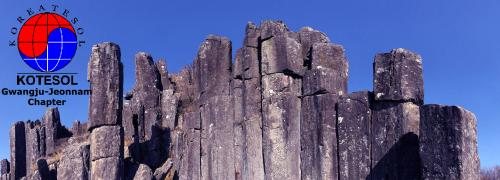
Gwangju-Jeonnam Chapter May Meeting
Time: Saturday, May 10, 2014, 1:45–5:00 p.m.
Place: Chosun University Main Building (Gwangju), 4th Floor, Rm 4211
||||||| The May Chapter Meeting program and newsletter is attached as a PDF file at the bottom of this web page.
----- Schedule -----
1:45 pm: Sign-in and Meet-and-Greet (Admission is free. Future membership is welcomed.)
2:00–2:50 pm: Featured PRESENTATION 1
Implementing CLT in Large Korean University Classes
Matthew McLaughtin-Stonham (Chosun University)
2:50 - 3:10 pm: Refreshment Break
3:10 - 4:00 pm: FEATURED PRESENTATION 2
Language Learning Strategy Awareness
Maria Neliza “Ynell” Lumantao (Chonnam National University)
4:00 Swap-Shop Session
Everyone is invited to Share one of your Teaching Ideas, Classroom Activities, and ELT Games, Books, etc. (Handouts welcomed.)
4:30 pm: Announcements / Drawing for Door Prizes / Closing
After-meeting dinner at a downtown location.
Reflective Practice Meeting: If you are interested in Reflective Practice, our next meeting will be at 11:00 AM on May 10, 2014. We would love to exchange ideas and experiences with you! For venue or other information, please join our Facebook group (Reflective Practice SIG Gwangju-Jeonnam) or contact either jocelynmnu@yahoo.com or Tyson Vieira tyson.vieira@att.net.
Presentation Abstracts and Presenter Information
Implementing Communicative Language Teaching in Large Korean University Classes
By Matthew McLaughlin-Stonham
Communicative Language Teaching (CLT) has endured an often strained and reluctant, although arguably essential, relationship with English language teaching in Northeast Asia. The South Korean example is no exception. Much of the previous research studies have centered on a number of ideological and educational constraints which have, in one way or another, affected the successful implementation of CLT since the approach was adopted in Korean language education in the 1990’s. This work will give special attention to the university conversation classes that offer particular challenges to the teacher in terms of class size and potential classroom structural obstacles.
Korean university students are sometimes alienated and inadvertently made to feel uncomfortable by the attempts of foreign instructors to implement a teaching approach which is fundamentally different to how they have been taught in previous language learning environments. Therefore, the aim of this presentation is two-fold. Firstly, we will briefly look at the potential issues that have arisen from the findings of previous studies. This will also include some data presentation based on the findings of a survey conducted with the Chosun University foreign teaching faculty and their general experiences of implementing CLT in their classes. Secondly, we will examine how we can deal with these issues by looking at how teachers can adopt some simple practical classroom strategies and activities to build trust and understanding with our students as well as improving their communicative competence.
Communicative Language Teaching in Korea has a long way to go in terms of being taken for granted as a standard approach, such as was true of the European case, for example. However, if teachers and educationists are more aware of the need to adapt their teaching approach to suit local educational contexts, there is every reason to believe that communicative competence will cease to be the golden fleece of language learning in Korea.
The Presenter
Matt McLaughlin-Stonham is from the United Kingdom and has recently completed an MA TESOL at The University of Nottingham, UK, where he focused his dissertation on CLT implementation in Korean universities. He has taught at Chosun University since 2010 as well as having taught EFL in the UK and Spain. He has also been a course leader for intensive summer language camps in the UK and will be returning to his native country permanently this autumn to teach EAL (English as an Additional Language) for the international faculty at Queen Ethelburga’s College, York. He holds a strong interest in the implementation of CLT in Confucian-heritage cultures and the adaptation of western-based teaching approaches in such environments.
______________________________________________
Language Learning Strategy Awareness
By Maria Neliza "Ynell" Lumantao
What are language learning strategies? Can they really help language learners speed up their learning process? Learning a foreign language is different from learning a first language in that children learning a first language do not need to explicitly memorize words and sentences, and practice what they just learned to achieve automaticity. They acquire their language as they are growing up through the influence of their environment and their innate cognitive language processing ability. In second language acquisition, however, most learners are older with previous knowledge of the world in addition to already having a first language. Such knowledge will either help them or slow their learning process. Therefore, it is imperative that teachers make their students aware that there are strategies that they can use to speed up their language learning process.
Rebecca Oxford (1990) defined language learning strategies as “specific actions, behaviors, steps, or techniques students do, often consciously, to facilitate the improvement of their progress in apprehending, internalizing, and using the target language.” Oxford categorized language learning strategies into direct and indirect strategies. Direct strategies are classified into memory, cognitive, and compensation strategies while indirect strategies include metacognitive, affective and social strategies. This presentation will give a general introduntion to the different strategies. A workshop on the application of several strategies will also be conducted, making this presentation very interactive.
The Presenter
Maria Neliza “Ynell” Lumantao was born in the Philippines. She holds a BA in Political Science (minor, Education), and MAs in both Business Administration and Linguistics. Currently she is a doctoral candidate in the Linguistics Program at Chonnam National University. Her research interest centers on second language acquisition with a focus on language learning strategies. Ynell has a teaching license and has been an EFL teacher for nine years. She is currently a TESOL instructor at New World Language Institute. Within KOTESOL, she is the Gwangju-Jeonnam Chapter Vice President and a member of the International Conference Committee.
||||||| The May Chapter Meeting program and newsletter is attached as a PDF file at the bottom of this web page.
| Attachment | Size |
|---|---|
| 403.71 KB |


